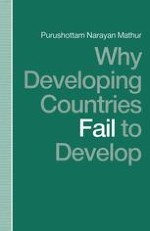1991 | OriginalPaper | Buchkapitel
The Role of Subsidies and Import Controls in Modernising Low-income Countries
verfasst von : Purushottam Narayan Mathur
Erschienen in: Why Developing Countries Fail to Develop
Verlag: Palgrave Macmillan UK
Enthalten in: Professional Book Archive
Aktivieren Sie unsere intelligente Suche, um passende Fachinhalte oder Patente zu finden.
Wählen Sie Textabschnitte aus um mit Künstlicher Intelligenz passenden Patente zu finden. powered by
Markieren Sie Textabschnitte, um KI-gestützt weitere passende Inhalte zu finden. powered by
Developing countries traditionally earn their foreign exchange through the export of primary commodities, which may be agricultural- or mineral-based. The foreign exchange earnings of the developing countries as a whole from this are, however, limited, due to the low price elasticity of world demand for the primary commodities. An individual country may try to increase its foreign exchange earnings by increasing its exports of these commodities, but as soon as other countries also try to do the same, the price of the commodity is likely to slide down so as to frustrate the efforts of all of them. So if the development process requires extra imports for investment, etc. it may have to be paid by the exports of non-traditional commodities, which can in most cases be only manufactured goods. The situation remains the same even if the development process is supported by international aid, as the loans available have to be repaid with interest, and that requires the availability of foreign exchange.
